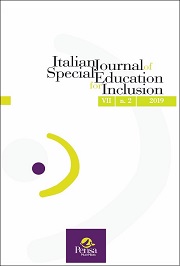Psychological aspects and teacher intercultural competences: a functional interaction for an effective inclusion
DOI:
https://doi.org/10.7346/sipes-02-2019-33Abstract
Teachers’ role in education requires many various abilities. Emotional aspects in the teaching process influence overall student performance, which has been proved in many studies. Particularly,
when considering the intercultural approach to education, it is important to emphasize that a successful education is not only a question of teaching and curriculum content, but includes many different values, feelings, perceptions and reciprocal relations freed from any kind of barriers. This study aimed to explore the emotional aspects and intercultural competences among teachers. For this purpose five scales were administered to the sixty-two in service teachers to see the role of emotional intelligence, cultural intelligence, and cross cultural sensibility on teacher multicultural attitude and its inclusive practice efficacy. The results shown that emotional competence and cultural adaptability are predictive, more than other variables, of teacher propensity to work in multicultural educational contexts.


